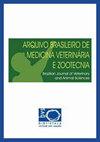阿霉素对患有恶性乳腺肿瘤的猫的肾毒性
IF 0.5
4区 农林科学
Q4 VETERINARY SCIENCES
Arquivo Brasileiro De Medicina Veterinaria E Zootecnia
Pub Date : 2023-06-01
DOI:10.1590/1678-4162-12860
引用次数: 0
摘要
摘要本研究的目的是研究阿霉素对乳腺恶性肿瘤猫的肾毒性。所有入选的猫均未出现合并症,如经物理和实验室检查证实的肾病和/或心肌病,接受了根治性乳房切除术并伴有局部淋巴结切除,并接受了基于阿霉素的治疗方案。在治疗期间及治疗结束后2个月评估肾脏指标尿素、肌酐、对称二甲基精氨酸。在治疗开始及治疗结束后2个月分别行腹部超声、尿液分析及生化分析蛋白、尿肌酐、尿GGT,评估可能的肾脏改变。在研究期间进行的任何检查中,有6只猫没有出现肾脏改变。在这项研究中,两只猫出现了氮质血症,其中一只因为氮质血症严重而提前停止了治疗。在整个治疗过程中对患者进行临床成像和实验室监测是必不可少的,包括检测早期肾脏变化的分析物。因此,强调阿霉素是一种安全的药物,用于非肾病猫。本文章由计算机程序翻译,如有差异,请以英文原文为准。
Doxorubicin nephrotoxicity in cats (Felis catus) with malignant mammary neoplasms
ABSTRACT The aim of the study was to investigate the nephrotoxicity of doxorubicin in cats with malignant neoplasms of the mammary gland. All selected cats did not present comorbidities such as nephropathies and/or cardiomyopathies, confirmed by physical and laboratory tests, underwent radical mastectomy associated with regional lymph node excision and were treated with a protocol based on doxorubicin. Renal markers of urea, creatinine, symmetrical dimethylarginine were evaluated during all the treatment, and two months after the end. Abdominal ultrasound, urinalysis and biochemical analysis of protein, urinary creatinine and urinary GGT were performed in the beginning and two months after the end of the treatment, to evaluate possible renal alterations. Six cats did not present renal alterations in any exams performed during the study. Two cats presented azotemia during this study, and one of them stopped the treatment early, because of the intense azotemia. Clinical imaging and laboratory monitoring of patients throughout the treatment is essential, including the measurement of analytes that detect kidney changes early. Thus, it is emphasized that doxorubicin is a safe drug for use in non-nephropathic cats.
求助全文
通过发布文献求助,成功后即可免费获取论文全文。
去求助
来源期刊
CiteScore
0.80
自引率
25.00%
发文量
111
审稿时长
9-18 weeks
期刊介绍:
Publica artigos originais de pesquisa sobre temas de medicina veterinária, zootecnia, tecnologia e inspeção de produtos de origem animal e áreas afins relacionadas com a produção animal. Atualmente a revista mantém 628 permutas (419 internacionais e 209 nacionais), sendo um verdadeiro suporte para o recebimento de periódicos pela Biblioteca da Escola.
A partir de 1999, a Escola de Veterinária delegou à FEP MVZ Editora o encargo do gerenciamento e edição de todas suas publicações, inclusive do Arquivo, ficando somente com o apoio logístico (instalações, equipamentos, pessoal etc.). O apoio financeiro é exercido pelo CNPq/FINEP e pela própria FEP MVZ.

 求助内容:
求助内容: 应助结果提醒方式:
应助结果提醒方式:


